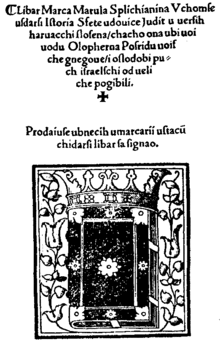Judita (Marko Marulić)
Judita is an important Croatian work, which was completed in 1501 by the Croatian writer and European humanist Marko Marulić . The work established Marulić's reputation as the "father of Croatian literature". It was published three times during his lifetime (1521, 1522, 1523).
content
In his book he edited a story from the Old Testament about the courageous widow Judita, who saves the city of Betulia with her heroic deed, the seduction and the murder of the Assyrian army leader Holofern . Marulić speaks allegorically about the danger in which the city of Split was, which was exposed to Turkish attacks at the time the epic was written. Given the location of his fatherland, which was besieged by the Ottomans , the basic idea of his epic was that one should have confidence in God and in eternal justice. He was the first poet to write poetry for the people to encourage them to fight the Ottomans. He wanted to bring Judita closer to the common man. The theme of the epic is Judita's liberation of Jerusalem , her faith and love for her homeland. The epic consists of 2126 doubly rhyming twelve syllables , which were composed in 6 chants.
action
1. Singing
In the first song Marulić describes the Babylon ruler Nabukodonosor that Syria and Palestine conquered. The writer also describes his desire to rule the world and sends his army leader Holofern to besiege as many countries as possible.
2. Singing
In the second song, Marulić describes Holofern's war missions and his arrival in Israel . The writer also describes the fear of the locals and their prayers to God to save them.
3. Singing
In the third song, the writer describes how Holofern surrounded Betulia and turned off the water supply to the city so that the Jews surrender. Then the city guides wanted to surrender, but Ozij asks the Jews to be patient with God's help for another 5 days.
4. Singing
In the fourth song, Marulić describes Judita, who prays to God and moves out of town the same night with her slave Abra.
5. Singing
In the fifth song the writer describes how Holofern invites Judita to his tent for dinner. When he falls asleep drunk after the fourth day, Judita approaches him and chops off his head. Then she puts her head against the city wall so that the followers can see it.
6. Singing
Canto 6 describes the events in Jerusalem after the departure of Holofern's army: Judita goes to Jerusalem for three months and then comes home. In her later life, after Manase's first husband, she did not remarry. After her death, she was pityed by her people for seven days, because thanks to her there were no wars.
Biblical "Judita"
“Judita” is a biblical story written in Hebrew . It's about Judita, a savior of Jerusalem and the people of God. The action takes place in the city of Esdrelon, at the time of the reign of the Assyrian King Nabukodonosor. He sent death posts led by Holofern to ruin anyone who opposes them. Holofern terrified the people and came to Betulia. There the people of God opposed him. They settled and waited to run out of food and water, then Judita prevented the destruction of their people. In the work of the unknown author, the biblical "Judita", the love of the Jewish homeland and religion stand out. Judita stands as a symbol for the Jewish people . The work is from the first or second century BC. And consists of 5 parts:
1. Holofern's military combat mission 2. Threatening Betulia 3. Judita 4. Judita and Holofern 5. Victory
Judita's analysis
Judita is noble and devout, a person of iron character. She saw that there was still a temptation before Israel that made many lose heart. She decides to do something that would be impossible without God's help. The love for God gave her strength and courage to walk between enemies. Taking advantage of her beauty, she bravely tempted Holofern, leader of Nabukodonosor's army , and chopped off his head. Thus, she saved the Jews from decline.
style
The style is very figurative with lots of comparisons and metaphors . The characters, especially Judita, are described in great detail, as is their appearance as well as the character. Our reading and analysis of Judita today complicates the fact that the work is written in the Croatian dialect Old Cakavian , with an abundance of forms and words that are not used today. But if you read carefully, you can understand its twelve syllables. They show us the writer's experience and the difficult situation at that time. The double-rhymed twelve-silver with which the work was written is the most important verse in Croatian literature .
